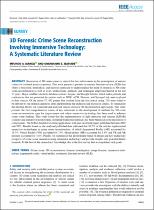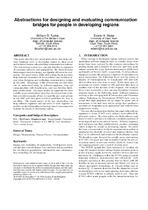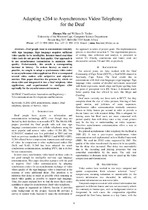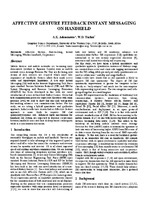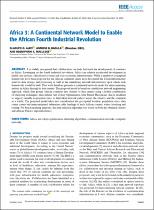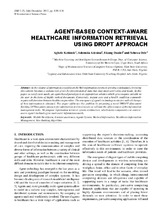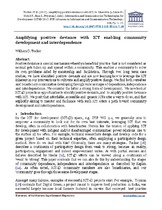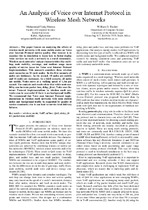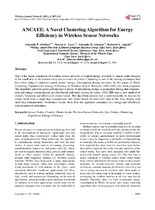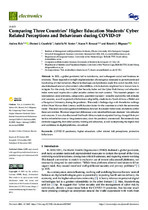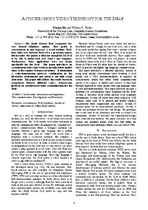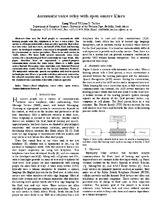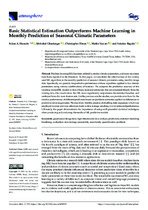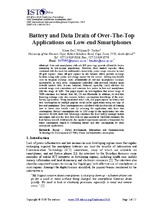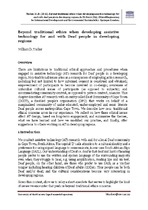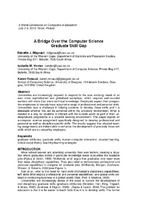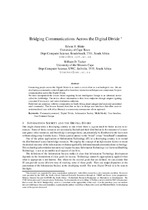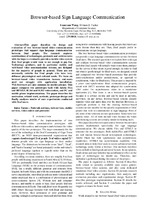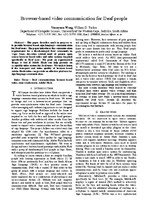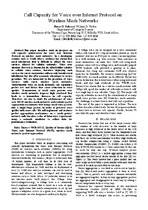Browsing Research Articles (Computer Science) by Title
Now showing items 1-20 of 170
-
3D forensic crime scene reconstruction involving immersive technology: A systematic literature review
(Institute of Electrical and Electronics Engineers, 2022)Recreation of 3D crime scenes is critical for law enforcement in the investigation of serious crimes for criminal justice responses. This work presents a premier systematic literature review (SLR) that offers a structured, ... -
Abstractions for designing and evaluating communication bridges for people in developing regions
(ACM, 2010)This paper describes two novel abstractions that help soft- ware engineers work in developing regions to align social and technical factors when building communication systems. The abstractions extend two concepts familiar ... -
Adapting x264 to asynchronous video telephony for the Deaf
(Telkom, 2008)Deaf people want to communicate remotely with sign language. Sign language requires sufficient video quality to be intelligible. Internet-based real-time video tools do not provide that quality. Our approach is to use ... -
Affective gesture feedback Instant Messaging on handhelds
(Institute of Electrical and Electronics Engineers, Inc., 2004)Mobile devices and mobile networks are becoming more data-centric (evident in Japanese I-mode) even as mobile network voice Average Revenue Per User are declining, new stream of data services are required which must take ... -
Africa 3: A continental network model to enable the African fourth industrial revolution
(IEEE, 2020)It is widely recognised that collaboration can help fast-track the development of countries in Africa. Leveraging on the fourth industrial revolution, Africa can achieve accelerated development in health care services, ... -
Agent-based context-aware healthcare information retrieval using DROPT approach
(International Science Press, 2012)As the volume of information available on the Web information systems is growing continuously, browsing this content becomes a tedious task given the presentation of data that does meet user's aims and needs. In this paper, ... -
Amplifying positive deviance with ICT enabling community development and interdependence
(Springer, 2017)Positive deviance is a social mechanism whereby a beneficial practice that is not considered as normal gets taken up and spread within a community. This enables a community to solve its own problems aided by mentorship and ... -
An analysis of voice over Internet Protocol in wireless mesh networks
(IEEE, 2014)The paper focuses on analyzing the affects of wireless mesh networks with some mobile nodes on Voice over Internet Protocol service quality. Our interest is to examine this in simulation to learn how to better deploy voice ... -
ANCAEE: A novel clustering algorithm for energy efficiency in wireless sensor networks
(Scientific Research Publishing, 2011)One of the major constraints of wireless sensor networks is limited energy available to sensor nodes because of the small size of the batteries they use as source of power. Clustering is one of the routing techniques that ... -
Article comparing three countries’ higher education students’ cyber related perceptions and behaviours during COVID-19
(MPDI, 2021): In 2020, a global pandemic led to lockdowns, and subsequent social and business restrictions. These required overnight implementation of emergency measures to permit continued functioning of vital industries. Digital ... -
Asynchronous video telephony for the Deaf
(Telkom, 2007)The South African Deaf community has very limited telephony options. They prefer to communicate in sign language, a visual medium. Realtime video over Internet Protocol is a promising option, but in reality, the quality ... -
Automatic voice relay with open source Kiara
(Telkom, 2009)One way for Deaf people to communicate with hearing people over the telephone is to use a voice relay. The service is often provided with a human relay operator that relays text into voice, and vice versa, on behalf of the ... -
Basic statistical estimation outperforms machine learning in monthly prediction of seasonal climatic parameters
(MPDI, 2021)Machine learning (ML) has been utilized to predict climatic parameters, and many successes have been reported in the literature. In this paper, we scrutinize the effectiveness of five widely used ML algorithms in the ... -
Battery and data drain of over-the-top applications on low-end smartphones
(IIMC International Information Management Corporation, 2018)Low-end smartphones with sub $50 price tags provide affordable device ownership to low-income populations. However, their limited capacity, when combined with the need for multimodal connectivity, raises usage concerns in ... -
Beyond traditional ethics when developing assistive technology for and with deaf people in developing regions
(Springer, 2015)There are limitations to traditional ethical approaches and procedures when engaged in assistive technology (AT) research for Deaf people in a developing region. Non-traditional issues arise as a consequence of employing ... -
A bridge over the computer science graduate skill gap
(2013)Universities are increasingly required to respond to the ever evolving needs of an ever more sophisticated and globalised workplace, which requires well-rounded workers with more than mere technical knowledge. Employers ... -
Bridging communications across the digital divide
(CTIT, 2004)Connecting people across the Digital Divide is as much a social effort as a technological one. We are developing a community-centered approach to learn how interaction techniques can compensate for poor communication across ... -
Browser-based sign language communication
(Telkom, 2010)This paper describes the design and evaluation of two browser-based video communication prototypes that support sign language communication between Deaf people. The research explores combinations of technologies, protocols ... -
Browser-based video communication for deaf people
(Telkom, 2009)This paper describes work in progress to to provide browser-based sign language communication for deaf users. The paper introduces the communication requirements for a disadvantaged Deaf community in Cape Town, describes ... -
Call capacity for voice over Internet Protocol on wireless mesh networks
(Telkom, 2010)This paper describes work in progress on call capacity optimization for voice over Internet Protocol on wireless mesh networks. In a developing country such as South Africa, evidence has shown that rural inhabitants find ...

